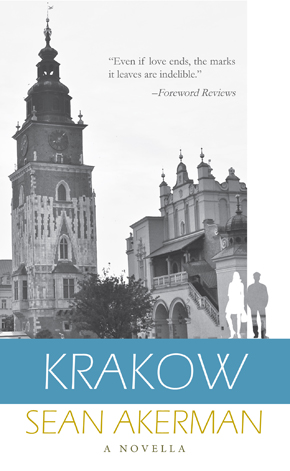Him and Her:
On Sean Akerman’s ‘Krakow’
A review by Matt Kubacki, Ed.D.
Sean Akerman, “Krakow”
Harvard Square Editions, 2018
104 pages, softcover, $22.95
 “Krakow” tells the story of a couple (referred to as “[Him]” and “[Her]”) through the first-person accounts purportedly found in a journal (really composed by the author.) It is told in alternating sections by each member of the couple. The reader is treated to each one’s inner perspective of the relationship’s trajectory, privy to the secrets, yearnings and confessions unknown to the other partner. “Krakow” plumbs the depths of a relationship with honesty in its ragged edges, raw emotion in its tone and poetry in its language. It is haunting, and I have a feeling Akerman’s book will linger long in my thoughts.
“Krakow” tells the story of a couple (referred to as “[Him]” and “[Her]”) through the first-person accounts purportedly found in a journal (really composed by the author.) It is told in alternating sections by each member of the couple. The reader is treated to each one’s inner perspective of the relationship’s trajectory, privy to the secrets, yearnings and confessions unknown to the other partner. “Krakow” plumbs the depths of a relationship with honesty in its ragged edges, raw emotion in its tone and poetry in its language. It is haunting, and I have a feeling Akerman’s book will linger long in my thoughts.
“Krakow” claims to be verbatim journals found in an apartment in Midwood, Brooklyn. A short introductory section, “An Explanation,” is signed by the one who found them, “Sean Akerman.” Even though it is questionable that the couple would leave behind these deeply personal items, Akerman does explain it with the rhetorical question, “[W]hy would you ever want to cart these reminders with you after?” which I suppose is true.
According to that same introductory section, the book’s title, “Krakow,” “comes from the place for which they both longed.” If that is so, why does it take fifty pages for [Him] to get to his thoughts on that place? [Her], on the other hand, writes of Krakow and that longing in a much more up-front and believable way, addressing it throughout her section. Perhaps this is meant to signify that [Him] is withholding his deeper feelings or, worse yet, not feeling the type of longing that she is, while [Her] is open, honest, and emotional—hints of the mismatch that dooms them.
To be sure, “Krakow” is suffused with memory, and Akerman’s prose does secure the reader’s belief that what is remembered jibes with what is actual in these characters’ lives, as there is a back-and-forth fact checking the reader is privy to in their alternating sections. Most of the journals focus on realistic, practical actuality. There is heartbreak, there is betrayal, there is the train and the park. Yet, there are moments like those in the sections below where the characters come alive through their longings, their dreams, and most importantly their memories.
[Him]:
“Last night, I dreamt of Krakow, where we traveled last spring. In the dream, we were
walking through a woodlot spliced with sunlight. The path sloped down a long ravine marked with shrubbery that resembled the bodies of bears. Far away, to the west, a few actual bears lumbered along.”[Her]:
“My skin felt smooth and new, and for some reason the air was saturated with the smell of lavender. I was more interested in how the men next to me felt at home in the world. This is what we were all meant to do, and we were doing it. Here I am writing about this many months later, and I wonder how much perfection this moment had when it was happening. I don’t think it is different than how I am remembering it.”
To get to the end of “Krakow” is to get to that place that was told to us at the beginning, where the relationship is broken, the parts have been sundered, and the journals have been left in an otherwise abandoned apartment. The structure here plays a part, as [Her] literally gets the last word. This is also where the book’s style of embracing the ragged, raw, and poetic is strongly and effectively illustrated. [Her] writes,
“I know you hold inside of you many worlds that you do not want to show to me, and this is one of them. If you think that I would spend my days walking down the street in silent anger, holding hands, you are crazy.”
With “Krakow,” Akerman presents characters to be explored through their writings and interrelation, all of whom become fully realized and complex, flesh-and-blood people. As such, readers will alternately care about them, empathize with them, dislike them, and get frustrated by them. We join in their victories and defeats, their regrets and yearnings, and their complicated lives. It remains a testament to Akerman, with the notion that what is written lingers in the mind of the reader long after the book has ended.

Matt Kubacki is Dean for Academic and Career Engagement at Wagner College, Staten Island, N.Y.
